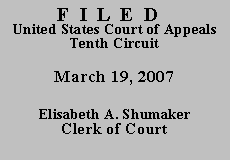

| UNITED STATES OF AMERICA, |
|
| v. | |
| JOSE ANTONIO MONTES-CANO, |
Jose Antonio Montes-Cano pled guilty to illegal reentry after deportation subsequent to an aggravated felony conviction. He appeals from the sentence, claiming it is unreasonable. Exercising jurisdiction under 28 U.S.C. § 1291, we affirm.
Background
On June 15, 2005, Montes-Cano was indicted for illegal re-entry after deportation subsequent to an aggravated felony conviction, in violation of 8 U.S.C. § 1326(a), (b)(2). Montes-Cano pled guilty to the indictment.
The pre-sentence report (PSR) applied §2L1.2 of the United States Sentencing Guidelines. Under §2L1.2(a), the base offense level was 8.(1) Because Montes-Cano was previously deported following a felony drug-trafficking conviction for which the sentence exceeded 13 months, the PSR increased the base offense level by 16 levels. See §2L1.2(b)(1)(A)(I). Applying a 2 level downward adjustment for acceptance of responsibility, see USSG §3E1.1(a), the PSR calculated a total offense level of 22. Using the same felony conviction used to enhance the base offense level by 16, the PSR calculated a criminal history category of III. Based on a total offense level of 22 and a criminal history category of III, the guideline range was 51-63 months imprisonment. See USSG §5(A). At sentencing, the government moved for an additional 1 point reduction in the base offense level for acceptance of responsibility. See USSG §3E1.1(b). The district court granted the motion, resulting in a new guideline range of 46-57 months. Given this advisory range, the district court sentenced Montes-Cano to 51 months imprisonment.
Discussion
Montes-Cano challenges his sentence under United States v. Booker, arguing it is unreasonable because it is based on "double counting." See 543 U.S. 220, 261 (2005). Specifically, he argues the district court improperly used his prior felony drug-trafficking conviction in the calculation of both his total offense level and criminal history category.
Since Montes-Cano concedes he did not raise this issue before the district court, we review for plain error. United States v. Pursley, 474 F.3d 757, 769 (2007). "Plain error occurs when there is (1) error, (2) that is plain, which (3) affects substantial rights, and which (4) seriously affects the fairness, integrity, or public reputation of judicial proceedings." United States v. Gonzalez-Huerta, 403 F.3d 727, 732 (10th Cir.) (en banc) (quotations omitted), cert. denied, 126 S.Ct. 495 (2005). "[T]he error must be particularly egregious, as well as obvious and substantial," and we will reverse "solely in those circumstances in which a miscarriage of justice would otherwise result." United States v. Gilkey, 118 F.3d 702, 704 (10th Cir. 1997) (quotations omitted).
"[A] sentence that is properly calculated under the Guidelines is entitled to a rebuttable presumption of reasonableness." United States v. Kristl, 437 F.3d 1050, 1054 (10th Cir. 2006) (per curiam). In this case, the guidelines explicitly permitted the allegedly improper "double counting." See USSG §2L1.2, comment. n.6 ("A conviction taken into account under subsection (b)(1) is not excluded from consideration of whether that conviction receives criminal history points pursuant to Chapter Four, Part A (Criminal History)."). Thus, Montes-Canos's sentence is presumptively reasonable. To rebut the presumption of reasonableness, a defendant must show the sentence imposed is unreasonable using the factors set forth in 18 U.S.C. § 3553(a). Id. at 1055. Montes-Cano has failed to do so.
Montes-Cano contends the district court's double counting rendered his sentence unreasonable. But we recently upheld "double counting" in a case addressing the same guideline provision challenged here. United States v. Ruiz-Terrazas, -- F.3d --, 2007 WL 576034 (10th Cir. 2007). As Ruiz observed, "we have routinely upheld as reasonable the use of prior convictions to calculate both the criminal history category and a sentence enhancement where . . . the Guidelines authorize it." Id. at *6. Thus, the district court was permitted to "double count," since the guidelines expressly permitted it to do so. The district court stated it considered the factors of 18 U.S.C. § 3553(a) to determine a reasonable sentence. United States v. Sanchez-Juarez, 446 F.3d 1109, 1117 (10th Cir. 2006). It was not unreasonable for the sentencing judge to choose the guidelines approach.
The first prong of the plain error analysis requires us to find an error; yet, we discern no error at all. The matter is concluded.
AFFIRMED.
ENTERED FOR THE COURT
Terrence L. O'Brien
Circuit Judge
*.This order and judgment is not binding precedent except under the doctrines of law of the case, res judicata, and collateral estoppel. It may be cited, however, for its persuasive value consistent with Fed. R. App. P. 32.1 and 10th Cir. R. 32.1.
1.Appellant Montes-Cano was sentenced under the 2005 edition of the United States Sentencing Guidelines Manual. All citations to the guidelines in this opinion refer to the 2005 guidelines unless otherwise indicated.